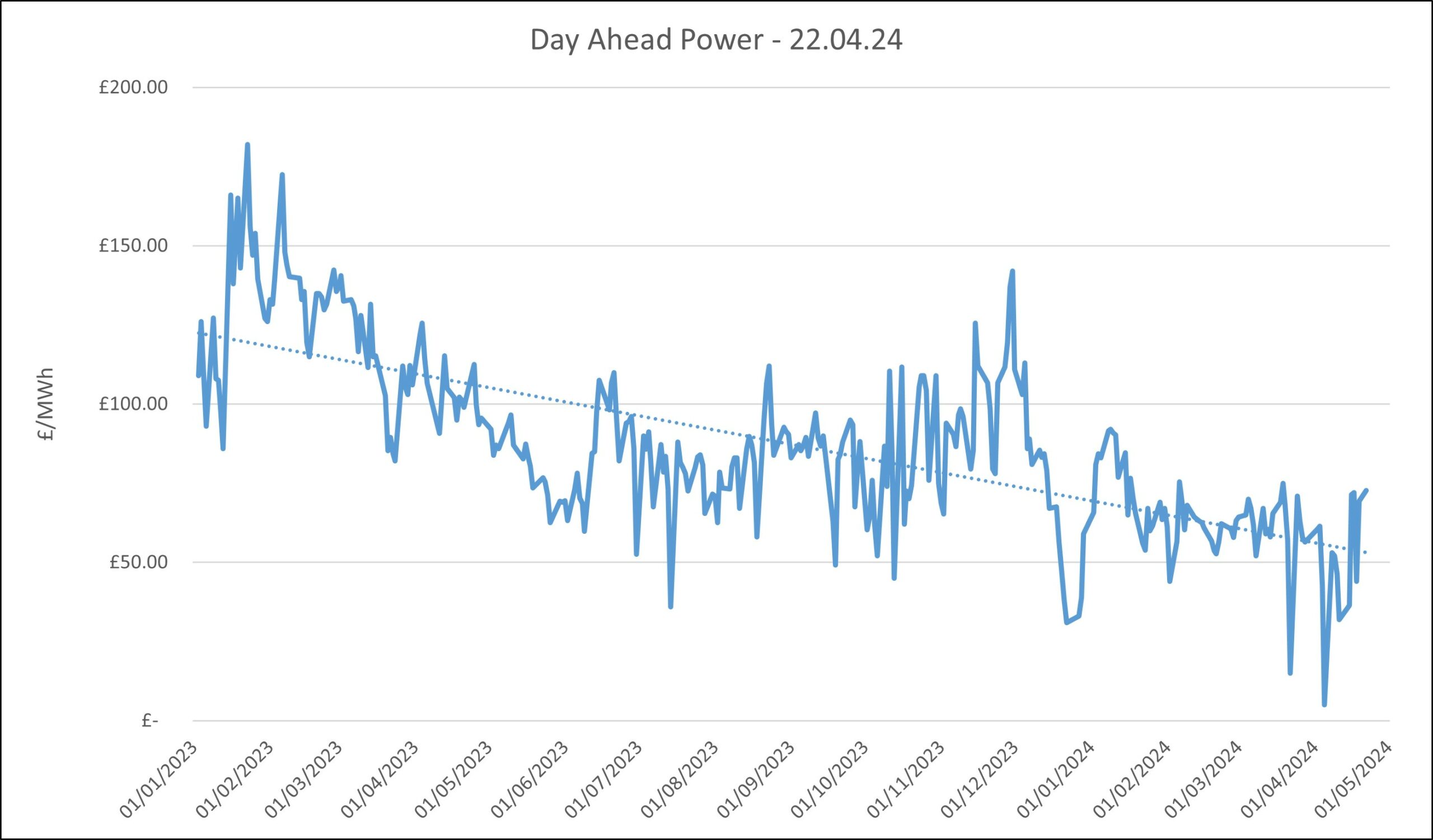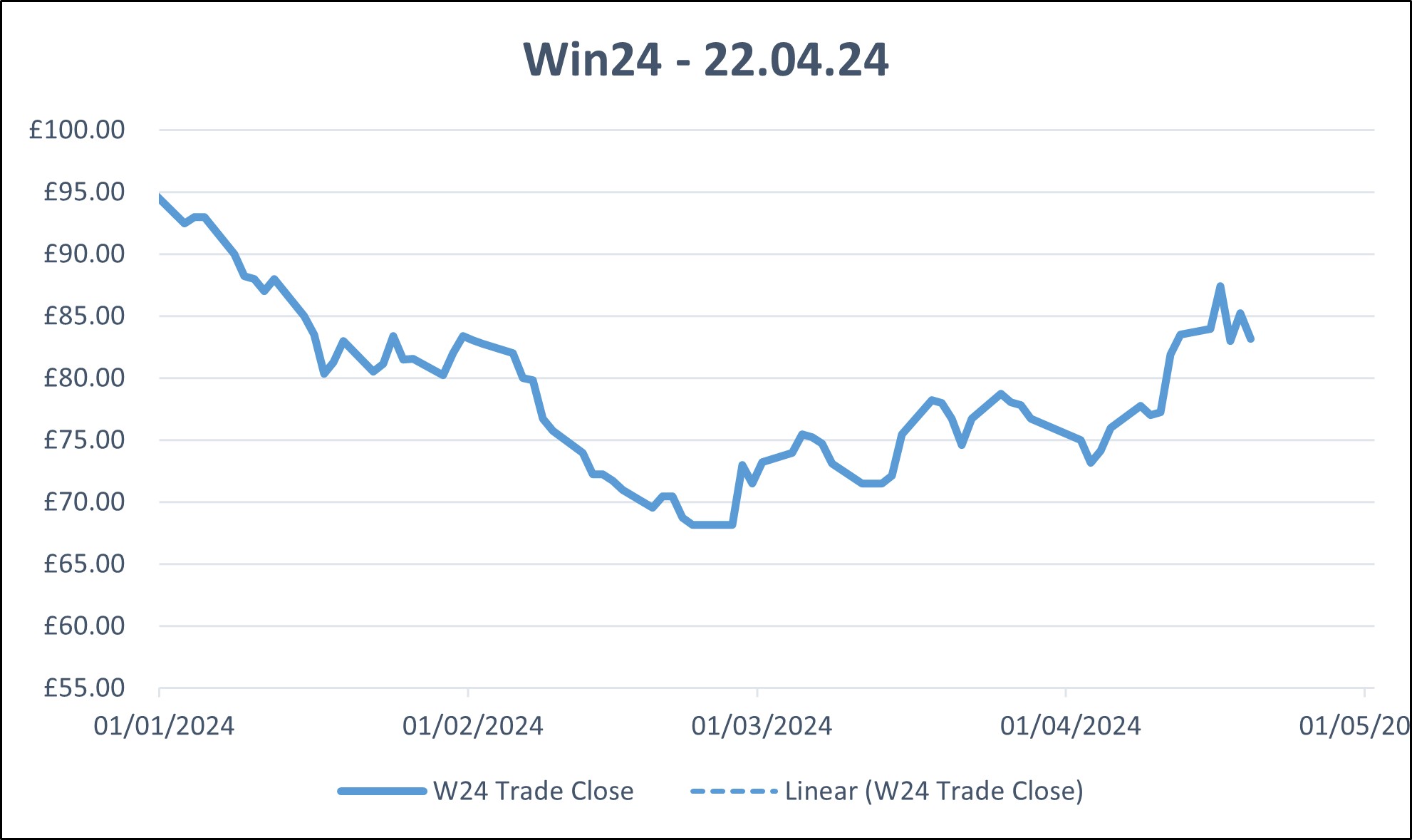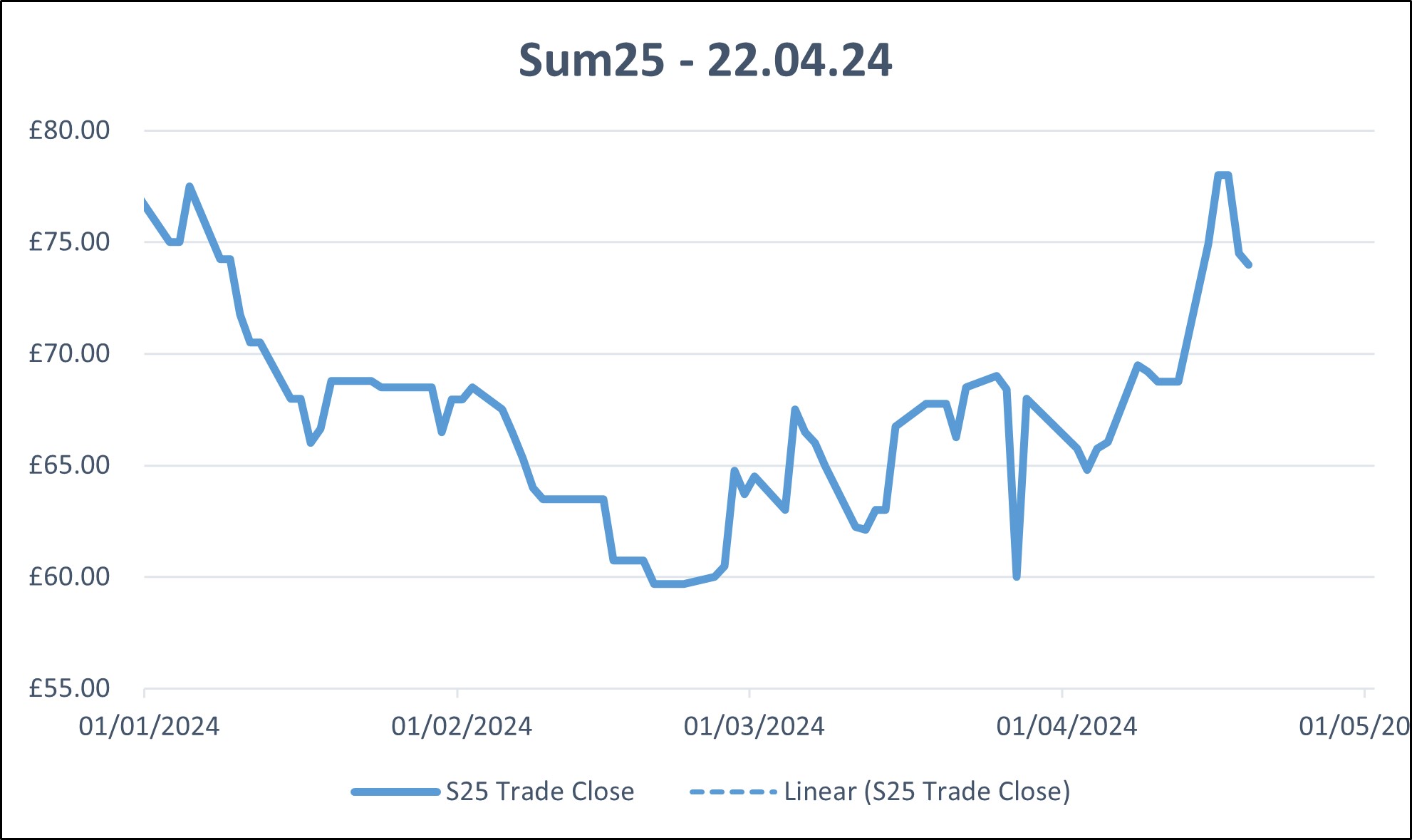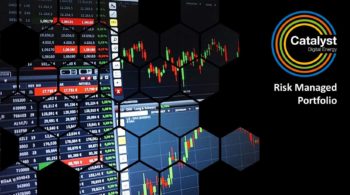Wholesale Electricity PricesThese wholesale electricity prices are updated to reflect the power price that electricity suppliers are paying
Wholesale electricity prices have progressed since the early 1990′s when the UK’s electricity industry evolved from a government controlled monopoly to a fully competitive market giving customers the freedom to choose their energy supplier. In the process a commodity market for wholesale electricity transactions was established. Here electricity is traded in large volumes, mostly between electricity producers selling the output of their power stations and electricity suppliers buying what their customers need. When power is traded in the UK market, it may be quoted in megawatt hours (MWh).

UK Wholesale Power - Day Ahead PricesThis chart shows the price of electricity on the wholesale market in GB for delivery the next working day
Last Updated 22.04.24
Day ahead power prices are available for delivery the next working day and typically reflect the true market rate as the conditions that make up the price are not influenced by long term events. Day-ahead electricity prices can vary depending on a number of factors, including the demand for electricity, the supply of electricity, and the cost of generating electricity. Prices may be higher during times of high demand and lower during times of low demand. They may also be influenced by factors such as the availability of different types of electricity generation, such as renewable energy sources like wind and solar, as well as the cost of fuel for traditional generation sources like coal or natural gas.
Latest Energy Market ReportsAll the latest UK energy market price news and views
UK Wholesale Power - Season Ahead Prices - Winter 2024This chart shows the price of electricity on the wholesale market in GB for delivery the next season - Win24
Last Updated 22.04.24
Unlike other markets that use a forward curve for pricing contracts for delivery at different points in time, the fact that wholesale electricity prices cannot be stored means that the traditional methods of pricing a forward contract (i.e spot price plus net carry) do not apply. As a result expected levels of supply and demand determine the forward price in £/MWh.
UK Wholesale Power - Summer 2025This chart tracks the prices of the next front summer season
Last Updated 22.04.24
Competition in the electricity and gas markets was phased in over an eight-year period, due to the sheer size of the task in terms of the number of customers and the technical complexities involved. In April 1990 the first tranche of the electricity market, covering about 5,000 large customers with a maximum demand of 1 MW and above, was opened to competition. Ten years later 81% of customers in this market were supplied by a non-local supplier.
UK Wholesale Prices Market
In 1991 British Gas also opened their market to competition with the first tranche affecting commercial gas customers with a consumption in excess of 25,000 therms per annum. The second tranche of the gas market was opened between 1992 and 1995, dependent on location and affected customers with a consumption of between 2,500 therms and 25,000 therms per annum. In April 1994 the second tranche of the electricity market, covering about 50,000 medium size customers with a maximum demand of 100 kW-1MW, was opened to competition. This market competition has also developed well and now more than 50% of customers are supplied by a non-local supplier.
The Last Group – Wholesale Power Prices
The last and the largest tranche of the commercial electricity market covering about 26 million customers with an annual consumption of up to 12,000 kWh, so-called ‘designated customers’, including domestic and small business customers, was progressively opened up for competition between September 1998 and May 1999.
Slightly earlier, in May 1998 the domestic gas market, some 18 million customers, was fully opened to competition. By the start of 2001 around 11 million (38%) of domestic customers had switched supplier at least once. Today daily energy trading takes place for wholesale electricity prices which determines the current, and future wholesale electricity prices on the market. All of our wholesale electricity prices graph reports and wholesale electricity prices historical can be found in our reporting section of our site along with our wholesale electricity prices Europe report and detailed analysis on wholesale electricity prices 2012 through to the present day.
Tracking Prices and Trends
There are a number of online platforms that provide real-time or near real-time data on wholesale electricity prices in various regions. These platforms often provide data on prices at different times of the day and in different market regions.
Other organizations, such as energy consulting firms and industry trade groups, publish reports on wholesale electricity prices on a regular basis. These reports can provide detailed data on wholesale electricity prices over time, as well as information on market trends and factors that may be affecting prices.
There are also a number of companies that specialize in providing market data on wholesale electricity prices. These providers typically offer a range of data products, such as real-time data feeds, historical data, and analytical tools.
Latest Business Energy Market NewsAll the latest UK energy market price news and views
-
scope 3 emissions net zero targets
The Science Based Targets initiative (SBTi) published a report on the 7th March in which it examined the success of its Business Ambition for 1.5°C campaign, which ran between June 2019 and October 2021. The report sets out the key findings from the campaign, as well as feedback from participating companies and key learnings and recommendations.
-
Review of Energy Market Arrangements (REMA)
The UK Government recently published its long-awaited second consultation on the Review of Electricity Market rrangements (REMA). A key announcement within the second consultation is the government’s further consideration of a zonal pricing market in GB.
-
Identifying a Half Hour Meter
So how do you know if you have a half hour electricity meter? It’s actually quite straight forward, and all you will need to find this out is a recent copy of your electricity bill. It doesn’t have to be the latest half hourly electricity invoice, any recent bill will do.
-
electric vehicle charging report
The report states that current progress to move to EVs is too slow, noting that EVs are more expensive than their petrol and diesel counterparts and there is not a sufficient amount of affordable EVs on the market.
Are electricity prices falling?
Wholesale electricity is a futures commodity and as such electricity can be purchased or sold at a predetermined price at a specified time in the future. Because of this reason electricity has many different time frames that it can be purchased so prices rise and fall on a daily basis depending on the time frame of purchase.
Are electricity prices set to rise in 2021?
Wholesale electricity prices are very volatile and depending on the contract delivery date can vary massively due to fluctuations in the wholesale trading price of the commodity.
What affects electricity prices?
A number of variable key drivers effect both the short term and long term wholesale electricity price. Such things as supply and demand fundamentals, the weather and routing maintenance can all have an impact of prices. Other factors such as geopolitical events or currency fluctuations all filter through to these commodity markets.
What is the electricity price?
The Wholesale Electricity Price is the price that is available on the wholesale market and can be purchased or sold within this environment. Suppliers and end users can access these markets to purchase electricity for a future delivery date.
Business Energy Consulting ServicesAll the latest UK energy market price news and views
-
Flexible Energy Baskets
Exclusive to Catalyst our supplier driven service connects your energy procurement with multiple other customers to form a stronger legion of energy buyers.
-
Flexible Energy Contracts
Our full range of flexible electricity and gas contracts provides solutions to support any type of business that wants to take advantage of access to the wholesale energy markets within a risk managed frame-work.
-
Business Water Services
With our business water services we can provide a full turn-key service that includes contract negotiation, retrospective water audits and cost recovery, ongoing invoice validation and a range of leak detection and water management services.
-
Business Electricity Prices
With our wide choice of business electricity suppliers and different product options available, you can be sure of a comprehensive choice of options to suite your business.
Electricity Prices In UKWhat goes into the electricity price in the UK
The price for electricity UK wide is typically priced based on various factors, and the structure can be quite complex. We look at some of the key components that influence electricity pricing in the UK.
First of all, we must look at the wholesale market prices. The wholesale market is where electricity generators sell their power to suppliers. Prices in the wholesale market can fluctuate based on supply and demand, weather conditions, fuel costs, and other market dynamics.
The wholesale market is responsible for the daily fluctuations in the UK electricity price. With different time frames associated with different buying periods, for example day-ahead electricity prices are for those companies large enough to have a flexible energy contract and who want to buy energy today for delivery tomorrow.
Those that typically have a fixed price energy contract, their prices will be made up of a combination of seasonal prices to give a final wholesale price to the energy element of the bill.
The price of electricity UK wide is often traded as a commodity in the futures market. The electricity futures market allows producers, consumers, and traders to buy and sell contracts that specify the future delivery of a certain quantity of electricity at an agreed-upon price.
These futures contracts help market participants manage the risk associated with fluctuating electricity prices on a daily basis.
Another large element for the final delivered UK power prices, is transmission and distribution costs. These are the costs associated with transporting electricity from power plants to end-users through the transmission and distribution networks.
The costs depend on the distance between the power source and the delivery point. The final power prices UK wide will have an element of the transmission and distribution costs associated with them, all dependent on the location of the meter in relation to the supply points.
Regulatory charges and various renewable taxes imposed by the government can also contribute to the overall electricity price. This may include environmental levies, carbon taxes, and other fees aimed at supporting renewable energy or addressing environmental concerns.
These costs contribute the largest element now to a fully delivered energy bill outside of the wholesale price of electricity.
In addition to this, the costs associated with metering, billing, and administrative processes can also be factored into the final delivered electricity prices, along with capacity charges. Capacity charges cover the costs associated with maintaining the capacity of the electricity grid to meet peak demand. It includes the costs of maintaining and upgrading the infrastructure to ensure a reliable power supply at all times.
It is the combination of these factors when added together provide a fully delivered energy bill. It’s important to note that residential, commercial, and industrial customers may have different tariff structures, and prices can vary among energy suppliers as their price to serve and the level of support that they provide to a customer will dramatically alter their required margin within a product.















